外研版七年级下听力训练一
- 格式:doc
- 大小:25.00 KB
- 文档页数:3
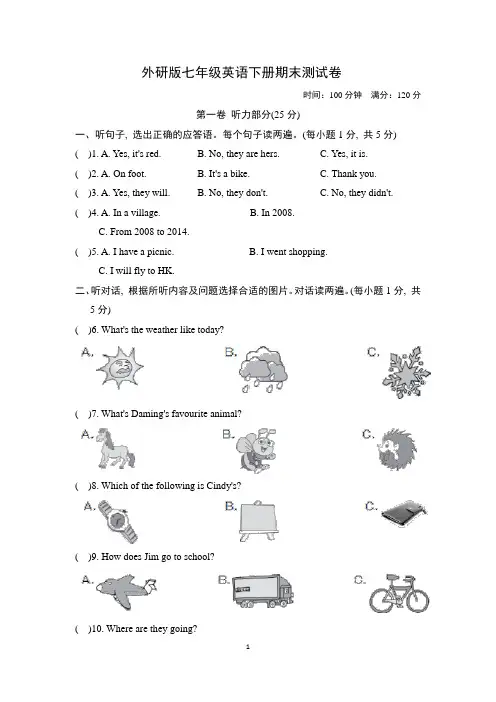
外研版七年级英语下册期末测试卷时间:100分钟满分:120分第一卷听力部分(25分)一、听句子, 选出正确的应答语。
每个句子读两遍。
(每小题1分, 共5分) ()1. A. Yes, it's red. B. No, they are hers. C. Yes, it is.()2. A. On foot. B. It's a bike. C. Thank you.()3. A. Yes, they will. B. No, they don't. C. No, they didn't.()4. A. In a village. B. In 2008.C. From 2008 to 2014.()5. A. I have a picnic. B. I went shopping.C. I will fly to HK.二、听对话, 根据所听内容及问题选择合适的图片。
对话读两遍。
(每小题1分, 共5分)()6. What's the weather like today?()7. What's Daming's favourite animal?()8. Which of the following is Cindy's?()9. How does Jim go to school?()10. Where are they going?三、听两段长对话, 根据所听内容选择正确的答案。
对话读两遍。
(每小题1分, 共5分)听下面一段对话, 回答第11、12小题。
()11. What does the boy want to buy for his grandfather?A. A book.B. A hat.C. A scarf.()12. When is the boy's grandfather's birthday?A. Next Thursday.B. Next Friday.C. Next Saturday.听下面一段对话, 回答第13-15小题。
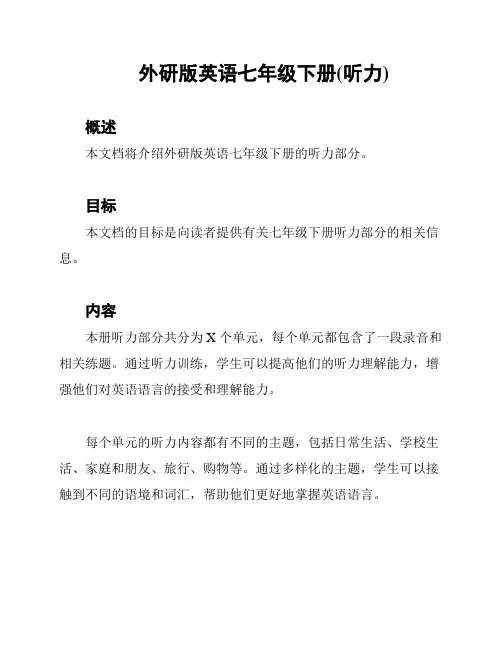
外研版英语七年级下册(听力)
概述
本文档将介绍外研版英语七年级下册的听力部分。
目标
本文档的目标是向读者提供有关七年级下册听力部分的相关信息。
内容
本册听力部分共分为 X 个单元,每个单元都包含了一段录音和相关练题。
通过听力训练,学生可以提高他们的听力理解能力,增强他们对英语语言的接受和理解能力。
每个单元的听力内容都有不同的主题,包括日常生活、学校生活、家庭和朋友、旅行、购物等。
通过多样化的主题,学生可以接触到不同的语境和词汇,帮助他们更好地掌握英语语言。
在每个单元的录音中,学生将听到不同的人物对话、描述和指导。
这些录音包括不同的语速和语调,为学生提供了多样的听力训练。
每个单元的练题旨在帮助学生检验他们的听力理解能力。
练题类型包括选择题、填空题和回答问题。
学生可以通过完成这些练题来巩固他们的听力技巧,并检查自己的答案是否正确。
总结
外研版英语七年级下册的听力部分旨在帮助学生提高他们的听力理解能力,并增强他们对英语语言的接受和理解能力。
每个单元都包含多样化的录音和练题,为学生提供了丰富的听力训练机会。
通过研究这一部分内容,学生可以扩展他们的词汇量,提高他们的语言表达能力,并培养他们的听力技巧。
这将为他们在英语研究的进一步阶段打下坚实的基础。
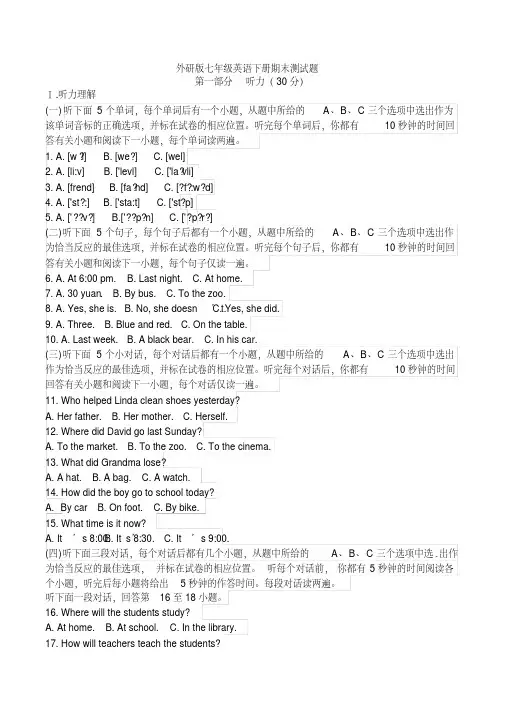
外研版七年级英语下册期末测试题第一部分听力(30分)Ⅰ.听力理解(一)听下面5个单词,每个单词后有一个小题,从题中所给的A、B、C三个选项中选出作为该单词音标的正确选项,并标在试卷的相应位置。
听完每个单词后,你都有10秒钟的时间回答有关小题和阅读下一小题,每个单词读两遍。
1. A. [w?l] B. [we?] C. [wel]2. A. [li:v] B. ['levl] C. ['la?vli]3. A. [frend] B. [fa?nd] C. [?f?:w?d]4. A. ['st?:] B. ['sta:t] C. ['st?p]5. A. ['??v?] B.['??p?n] C. ['?p?r?](二)听下面5个句子,每个句子后都有一个小题,从题中所给的A、B、C三个选项中选出作为恰当反应的最佳选项,并标在试卷的相应位置。
听完每个句子后,你都有10秒钟的时间回答有关小题和阅读下一小题,每个句子仅读一遍。
6. A. At 6:00 pm. B. Last night. C. At home.7. A. 30 yuan. B. By bus. C. To the zoo.C. Yes, she did.8. A. Yes, she is. B. No, she doesn’t.9. A. Three. B. Blue and red. C. On the table.10. A. Last week. B. A black bear. C. In his car.(三)听下面5个小对话,每个对话后都有一个小题,从题中所给的A、B、C三个选项中选出作为恰当反应的最佳选项,并标在试卷的相应位置。
听完每个对话后,你都有10秒钟的时间回答有关小题和阅读下一小题,每个对话仅读一遍。
11. Who helped Linda clean shoes yesterday?A. Her father.B. Her mother.C. Herself.12. Where did David go last Sunday?A. To the market.B. To the zoo.C. To the cinema.13. What did Grandma lose?A. A hat.B. A bag.C. A watch.14. How did the boy go to school today?A.By carB. On foot.C. By bike.15. What time is it now?s 8:30. C. It’s 9:00.A. It’s 8:00.B. It’(四)听下面三段对话,每个对话后都有几个小题,从题中所给的A、B、C三个选项中选出作为恰当反应的最佳选项,并标在试卷的相应位置。
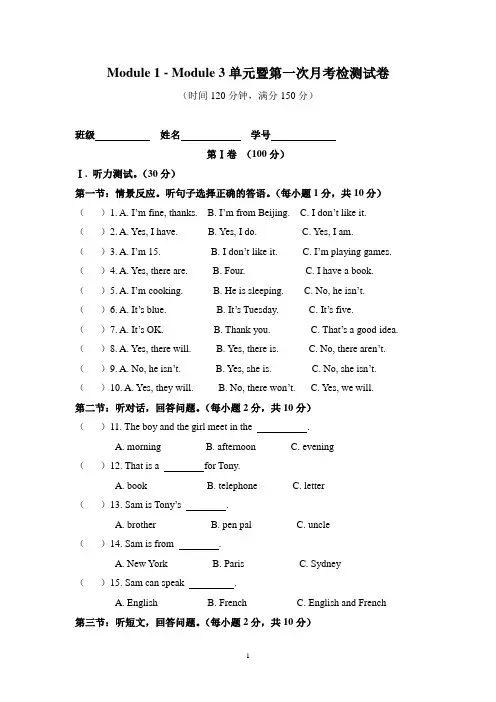
Module 1 - Module 3单元暨第一次月考检测试卷(时间120分钟,满分150分)班级姓名学号第Ⅰ卷(100分)Ⅰ. 听力测试。
(30分)第一节:情景反应。
听句子选择正确的答语。
(每小题1分,共10分)()1. A. I’m fine, thanks. B. I’m from Beijing. C. I don’t like it.()2. A. Yes, I have. B. Yes, I do. C. Yes, I am.()3. A. I’m 15. B. I don’t like it. C. I’m playing games. ()4. A. Yes, there are. B. Four. C. I have a book.()5. A. I’m cooking. B. He is sleeping. C. No, he isn’t.()6. A. It’s blue. B. It’s Tuesday. C. It’s five.()7. A. It’s OK. B. Thank you. C. That’s a good idea. ()8. A. Yes, there will. B. Yes, there is. C. No, there aren’t. ()9. A. No, he isn’t. B. Yes, she is. C. No, she isn’t.()10. A. Yes, they will. B. No, there won’t. C. Yes, we will.第二节:听对话,回答问题。
(每小题2分,共10分)()11. The boy and the girl meet in the .A. morningB. afternoonC. evening()12. That is a for Tony.A. bookB. telephoneC. letter()13. Sam is Tony’s .A. brotherB. pen palC. uncle()14. Sam is from .A. New YorkB. ParisC. Sydney()15. Sam can speak .A. EnglishB. FrenchC. English and French第三节:听短文,回答问题。
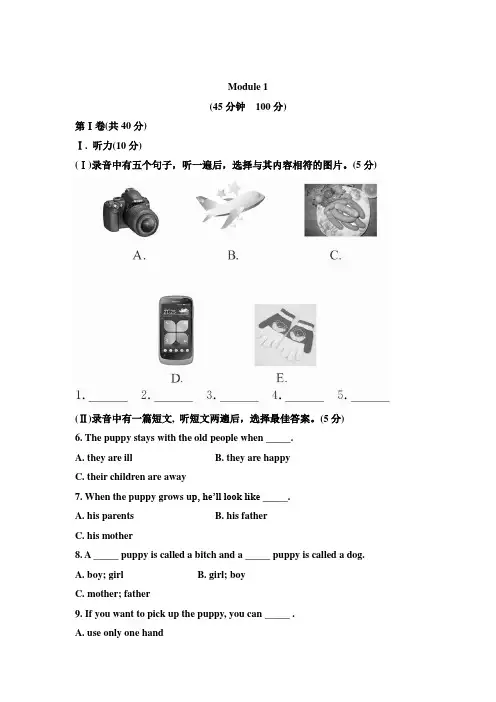
Module 1(45分钟100分)第Ⅰ卷(共40分)Ⅰ. 听力(10分)(Ⅰ)录音中有五个句子,听一遍后,选择与其内容相符的图片。
(5分)(Ⅱ)录音中有一篇短文, 听短文两遍后,选择最佳答案。
(5分)6. The puppy stays with the old people when _____.A. they are illB. they are happyC. their children are away7. When the puppy grows u p, he’ll look like _____.A. his parentsB. his fatherC. his mother8. A _____ puppy is called a bitch and a _____ puppy is called a dog.A. boy; girlB. girl; boyC. mother; father9. If you want to pick up the puppy, you can _____ .A. use only one handB. put your two hands under the front legsC. put one hand under the front legs and the other hand under the bottom10. Which of the following is not TRUE?A. The children like playing with the puppy.B. The puppy can be white, brown, black, red, or yellow, but it can’t be a mixture of colours.C. The puppy has four legs and a tail.Ⅱ. 单项选择(10分)1. My brother is _____ homework. He often _____ homework at home.A. does; doingB. doing; doC. do; doingD. doing; does2. In our city, _____ middle school students want to be a teacher in the future(将来) every year.A. thousandB. thousand ofC. thousands ofD. two thousand of3. Water is very dangerous sometimes. So we must be careful _____ it.A. ofB. withC. toD. in4. —Are these _____ crayons?—No,they aren’t _____.A. your; myB. his; hersC. yours; mineD. your; mine5. There are many school things in the shop.A. a lotB. fewC. lot ofD. a lot of6._____ the moment, my parents are _____ my teacher in the office.A. With; speaking toB. At; talking toC. With; talking toD. At; saying to7. This is _____ father, Mr Smith.A. Lucy’s and Lily’sB. Lucy and Lily’sC. Lucy’s and LilyD. theirs8. —Is this book Li Lei’s?—No, it isn’t _____. It’s _____.A. his; myB. him; mineC. mine; hisD. his; mine9. There _____ three dogs, two ducks and a pig under the tree.A. isB. areC. beD. /10. —What are you doing?—I’m _____ my mobile phone. I can’t _____ it.A. finding; findB. looking; findC. looking for; findD. looking for; look forⅢ. 完形填空(10分)The best way to studyWhat is the best way to study? This is a very important question. Some Chinese students often 1 very very hard for long hours. This is a 2 habit (习惯), and it is not a better way to study. An efficient (讲效率的) student must 3 enough sleep, enough food and enough 4 . Every 5 you need to take a walk, or play basketball or ping-pong or sing a song. When you return to your study, you will find yourself stronger than 6 and you’ll learn more.Perhaps we can 7 that learning English is 8 taking Chinese medicine. We mean that like Chinese medicine, the effects(效果) of your study come slowly but surely. 9 every day and effects will 10 just like Chinese medicine.1. A. play B. study C. sleep D. think2. A. best B. better C. good D. bad3. A. have B. do C. want D. make4. A. friends B. meals C. studies D. rest5. A. year B. week C. day D. hour6. A. ago B. before C. after D. ever7. A. say B. guess C. talk D. know8. A. about B. on C. as D. like9. A. Take B. Come C. Give D. Learn10. A. start B. work C. come D. goⅣ. 阅读理解(10分)Too Polite(礼貌过头了)There are many people on the bus. Some have seats, but some have to(不得不) stand. At a bus stop, a woman gets on the bus. An old man near the door tries to stand up.“Oh, no, thank you, ” the woman forces (强迫) him back to the seat. “Please don’t do that. I can stand. ”“But, madam(夫人), let me. . . , ”says the man.“I ask you to keep your seat(坐在你的座位上),” the woman says. She puts(放) her hands on the old man’s shoulders(肩膀).But the man still(仍然) tries to stand up, “Madam, will you please let me. . . ? ”“Oh, no, ”says the woman. She again(又) forces the man back.At last(最后) the old man shouts(大声喊), “I want to get off(下车) the bus! ” 阅读短文,判断正(T)误(F)。
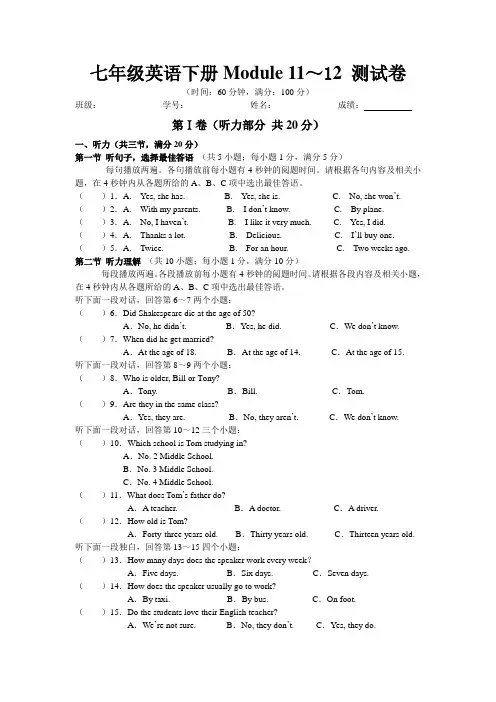
七年级英语下册Module 11~12 测试卷(时间:60分钟,满分:100分)班级:___________ 学号:____________ 姓名:____________ 成绩:第Ⅰ卷(听力部分共20分)一、听力(共三节,满分20分)第一节听句子,选择最佳答语(共5小题;每小题1分,满分5分)每句播放两遍。
各句播放前每小题有4秒钟的阅题时间。
请根据各句内容及相关小题,在4秒钟内从各题所给的A、B、C项中选出最佳答语。
()1.A. Yes, she has. B. Yes, she is. C. No, she won’t.()2.A. With my parents. B. I don’t know. C. By plane.()3.A. No, I haven’t. B. I like it very much. C. Yes, I did.()4.A. Thanks a lot. B. Delicious. C. I’ll buy one.()5.A. Twice. B. For an hour. C. Two weeks ago.第二节听力理解(共10小题;每小题1分,满分10分)每段播放两遍。
各段播放前每小题有4秒钟的阅题时间。
请根据各段内容及相关小题,在4秒钟内从各题所给的A、B、C项中选出最佳答语。
听下面一段对话,回答第6~7两个小题:()6.Did Shakespeare die at the age of 50?A.No, he didn’t. B.Yes, he did. C.We don’t know.()7.When did he get married?A.At the age of 18. B.At the age of 14. C.At the age of 15.听下面一段对话,回答第8~9两个小题:()8.Who is older, Bill or Tony?A.Tony. B.Bill. C.Tom.()9.Are they in the same class?A.Yes, they are. B.No, they aren’t. C.We don’t know.听下面一段对话,回答第10~12三个小题:()10.Which school is Tom studying in?A.No. 2 Middle School.B.No. 3 Middle School.C.No. 4 Middle School.()11.What does Tom’s father do?A.A teacher. B.A doctor. C.A driver.()12.How old is Tom?A.Forty-three years old. B.Thirty years old. C.Thirteen years old. 听下面一段独白,回答第13~15四个小题:()13.How many days does the speaker work every week?A.Five days. B.Six days. C.Seven days.()14.How does the speaker usually go to work?A.By taxi. B.By bus. C.On foot.()15.Do the students love their English teacher?A.We’re not sure. B.No, they don’t. C.Yes, they do.第三节、听取信息(共5小题;每小题1分,满分5分)听下面一段独白,请根据题目要求,从所听到的内容中获取必要的信息,并填入标号为16~20的横线上。
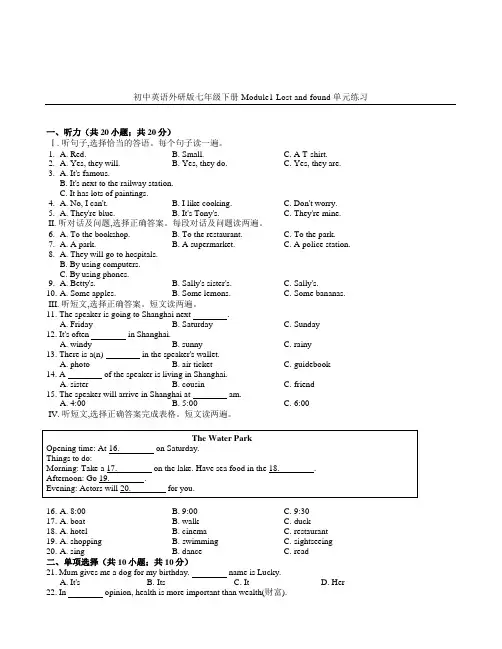
初中英语外研版七年级下册Module1 Lost and found单元练习一、听力(共20小题;共20分)Ⅰ. 听句子,选择恰当的答语。
每个句子读一遍。
1. A. Red. B. Small. C. A T-shirt.2. A. Yes, they will. B. Yes, they do. C. Yes, they are.3. A. It's famous.B. It's next to the railway station.C. It has lots of paintings.4. A. No, I can't. B. I like cooking. C. Don't worry.5. A. They're blue. B. It's Tony's. C. They're mine.II. 听对话及问题,选择正确答案。
每段对话及问题读两遍。
6. A. To the bookshop. B. To the restaurant. C. To the park.7. A. A park. B. A supermarket. C. A police station.8. A. They will go to hospitals.B. By using computers.C. By using phones.9. A. Betty's. B. Sally's sister's. C. Sally's.10. A. Some apples. B. Some lemons. C. Some bananas.III. 听短文,选择正确答案。
短文读两遍。
11. The speaker is going to Shanghai next .A. FridayB. SaturdayC. Sunday12. It's often in Shanghai.A. windyB. sunnyC. rainy13. There is a(n) in the speaker's wallet.A. photoB. air ticketC. guidebook14. A of the speaker is living in Shanghai.A. sisterB. cousinC. friend15. The speaker will arrive in Shanghai at am.A. 4:00B. 5:00C. 6:00IV. 听短文,选择正确答案完成表格。
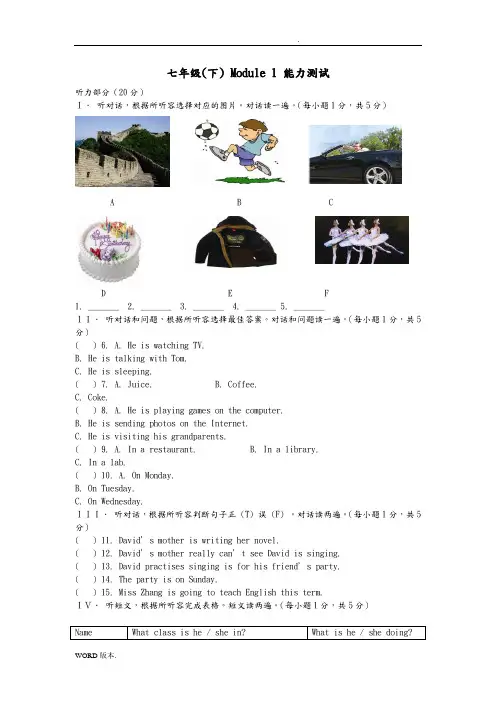
七年级(下) Module 1 能力测试听力部分(20分)I.听对话,根据所听容选择对应的图片。
对话读一遍。
(每小题1分,共5分)A B CD E F1. _______2. _______3. _______4. _______5. _______II.听对话和问题,根据所听容选择最佳答案。
对话和问题读一遍。
(每小题1分,共5分)( ) 6. A. He is watching TV.B. He is talking with Tom.C. He is sleeping.( ) 7. A. Juice. B. Coffee.C. Coke.( ) 8. A. He is playing games on the computer.B. He is sending photos on the Internet.C. He is visiting his grandparents.( ) 9. A. In a restaurant. B. In a library.C. In a lab.( ) 10. A. On Monday.B. On Tuesday.C. On Wednesday.III.听对话,根据所听容判断句子正 (T) 误 (F) 。
对话读两遍。
(每小题1分,共5分)( ) 11. David’s mother is writing her novel.( ) 12. Davi d’s mother really can’t see David is singing.( ) 13. David practises singing is for his friend’s party.( ) 14. The party is on Sunday.( ) 15. Miss Zhang is going to teach English this term.IV.听短文,根据所听容完成表格。
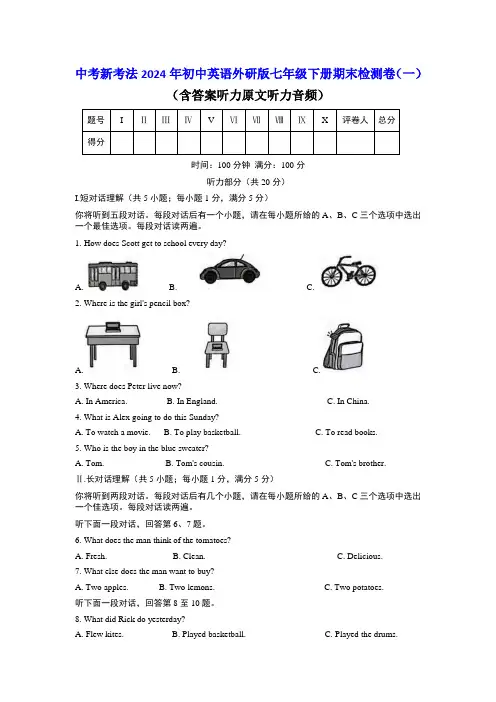
中考新考法2024年初中英语外研版七年级下册期末检测卷(一)(含答案听力原文听力音频)时间:100分钟满分:100分听力部分(共20分)I.短对话理解(共5小题;每小题1分,满分5分)你将听到五段对话。
每段对话后有一个小题,请在每小题所给的A、B、C三个选项中选出一个最佳选项。
每段对话读两遍。
1.How does Scott get to school every day?A. B. C.2. Where is the girl's pencil box?A. B. C.3. Where does Peter live now?A. In America.B. In England.C. In China.4. What is Alex going to do this Sunday?A. To watch a movie.B. To play basketball.C. To read books.5. Who is the boy in the blue sweater?A. Tom.B. Tom's cousin.C. Tom's brother.Ⅱ.长对话理解(共5小题;每小题1分,满分5分)你将听到两段对话。
每段对话后有几个小题,请在每小题所给的A、B、C三个选项中选出一个佳选项。
每段对话读两遍。
听下面一段对话,回答第6、7题。
6. What does the man think of the tomatoes?A. Fresh.B. Clean.C. Delicious.7. What else does the man want to buy?A. Two apples.B. Two lemons.C. Two potatoes.听下面一段对话,回答第8至10题。
8. What did Rick do yesterday?A. Flew kites.B. Played basketball.C. Played the drums.9. Where did Rick meet Jill last week?A. In the club.B. In the park.C. In the library.10. What does Jill look like?A. She is tall.B. She has big eyes.C. She has black hairⅢ.信息转换(共5小题;每小题2分,满分10分)你将听到一篇短文。
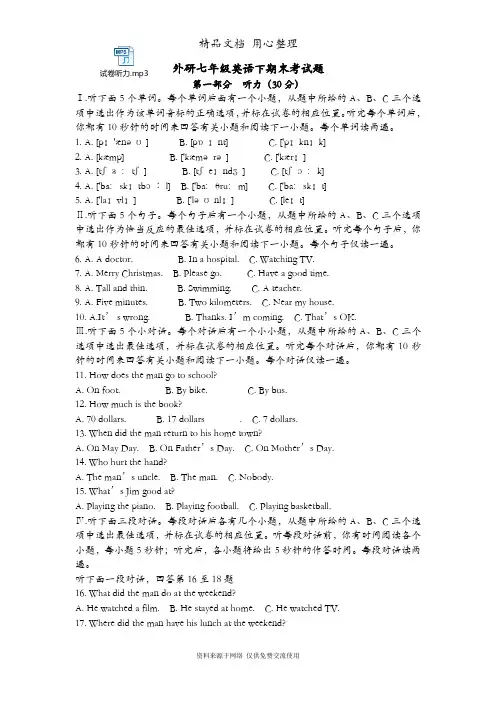
试卷听力.mp3第一部分听力(30分)Ⅰ.听下面5个单词。
每个单词后面有一个小题,从题中所给的A、B、C三个选项中选出作为该单词音标的正确选项,并标在试卷的相应位置。
听完每个单词后,你都有10秒钟的时间来回答有关小题和阅读下一小题。
每个单词读两遍。
1. A. [pɪ'ænəʊ] B. [pɒɪnt] C. ['pɪknɪk]2. A. [kæmp] B. ['kæmərə] C. ['kærɪ]3. A. [tʃɜːtʃ] B. [tʃeɪndʒ] C. [tʃɔːk]4. A. ['bɑːskɪtbɔːl] B. ['bɑːθruːm] C. ['bɑːskɪt]5. A. ['laɪvlɪ] B. ['ləʊnlɪ] C. [leɪt]Ⅱ.听下面5个句子。
每个句子后有一个小题,从题中所给的A、B、C三个选项中选出作为恰当反应的最佳选项,并标在试卷的相应位置。
听完每个句子后,你都有10秒钟的时间来回答有关小题和阅读下一小题。
每个句子仅读一遍。
6. A. A doctor. B. In a hospital. C. Watching TV.7. A. Merry Christmas. B. Please go. C. Have a good time.8. A. Tall and thin. B. Swimming. C. A teacher.9. A. Five minutes. B. Two kilometers. C. Near my house.10. A.It’ s wrong. B. Thanks. I’m coming. C. That’s OK.Ⅲ.听下面5个小对话。
每个对话后有一个小小题,从题中所给的A、B、C三个选项中选出最佳选项,并标在试卷的相应位置。
听完每个对话后,你都有10秒钟的时间来回答有关小题和阅读下一小题。
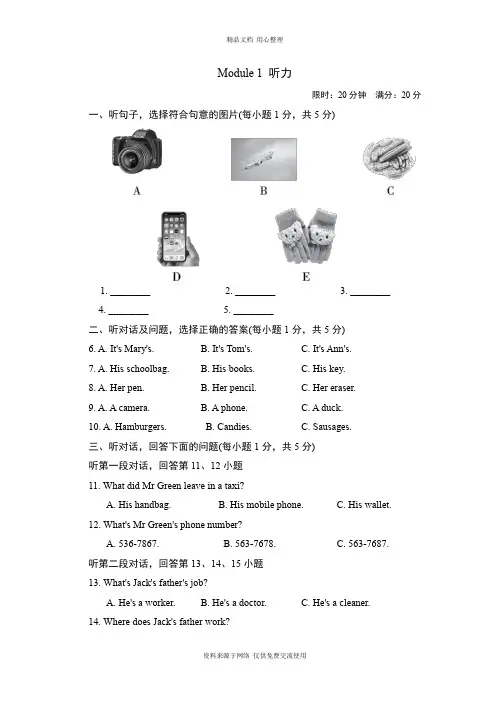
Module 1 听力限时:20分钟满分:20分一、听句子,选择符合句意的图片(每小题1分,共5分)1. ________2. ________3. ________4. ________5. ________二、听对话及问题,选择正确的答案(每小题1分,共5分)6. A. It's Mary's. B. It's Tom's. C. It's Ann's.7. A. His schoolbag. B. His books. C. His key.8. A. Her pen. B. Her pencil. C. Her eraser.9. A. A camera. B. A phone. C. A duck.10. A. Hamburgers. B. Candies. C. Sausages.三、听对话,回答下面的问题(每小题1分,共5分)听第一段对话,回答第11、12小题11. What did Mr Green leave in a taxi?A. His handbag.B. His mobile phone.C. His wallet.12. What's Mr Green's phone number?A. 536-7867.B. 563-7678.C. 563-7687.听第二段对话,回答第13、14、15小题13. What's Jack's father's job?A. He's a worker.B. He's a doctor.C. He's a cleaner.14. Where does Jack's father work?A. At a train station.B. At a factory.C. In a hospital.15. How does Jack's father go to work?A. By taxi.B. By train.C. By bus.四、听独白,选择正确的答案(每小题1分,共5分)16. The puppy stays with the old people when ________.A. they are illB. they are happyC. their children are away17. When the puppy grows up, he'll look like ________.A. his parentsB. his fatherC. his mother18. A ________ puppy is called a bitch and a(n) ________ puppy is called a dog.A. boy; girlB. girl; boyC. mother; father19. If you want to pick up the puppy, you can ________.A. use only one handB. put your two hands under the front legsC. put one hand under the front legs and the other hand under the bottom20. Which of the following is not TRUE?A. Most people like playing with the puppy.B. The puppy can be white, brown, black, red, or yellow, but it can't be amixture of colours.C. The puppy has four legs and a tail.参考答案听力材料:一、1. There are some delicious sausages on the plate.2. This camera works very well. It is very expensive.3. This beautiful mobile phone is mine. It's red.4. How lovely the gloves are. There are two little bears on them.5. —How do you go to your hometown?—By plane.二、6.W: Hi, Tom. Is this your phone?M: Yes, it is. Thanks, Mary.Q: Whose phone is this?7. W: Tom, what are you doing?M: I'm looking for my schoolbag. There are some books and my key in it.Q: What's Tom looking for?8. W: Jim, I can't find my eraser.M: Let me help you to find it.Q: What did the girl lose?9. W: Where is Betty?M: In the park. Look. She's taking photos with her camera.Q: What's in Betty's hand?10. W: What are you eating, Daming?M: I'm eating a sausage. It's my favorite food.Q: What's Daming's favorite food?三、Text 1W: Can I help you, sir?M: Yes. I left my handbag in a taxi this morning.W: Oh, I'm sorry to hear that. What's your name, please?M: My name is David Green.W: What's your phone number?M: It's 563-7687.W: OK. I'll write it down. If the taxi driver sends your handbag here, I'll call you.M: Thank you.Text 2W: Hi, Jack. What does your father do?M: He is a worker.W: Where does he work?M: In a lost and found office.W: Is he busy?M: Yes, he is. Every day he goes to work by bus at 7:00 in the morning and he comes back at 7:00 in the afternoon.W: Why is he so busy?M: Because there are lots of things that people lose at the train station.W: Yes. People often lose their things when their travellings are in a hurry.W: So we must be careful with our things when we go out.四、Hello, I am your new friend. I'm a puppy. And you can call me Dog. Mostpeople like to play with me. Old people like to stay with me, too. I can stay with them when their children are away. Look at my mother and father. I'll be like them when I grow up. I have four legs and a tail. My fur can be white,brown, black, red, or yellow, or it can be a mixture of colours. A girl puppy is called a bitch and a boy puppy is called a dog. If you want to pick me up, put one hand under my front legs and the other hand under my bottom.I am your friend. You can give me a short name like Pluto, Black orApple.听力答案:一、1~5: CADEB二、6~10: BACAC三、11~15: ACAAC四、16~20: CABCB。
外研版英语七年级下册模块检测题Module 1(45分钟100分)第Ⅰ卷(共40分)Ⅰ. 听力(10分)(Ⅰ)录音中有五个句子,听一遍后,选择与其内容相符的图片。
(5分)(Ⅱ)录音中有一篇短文, 听短文两遍后,选择最佳答案。
(5分)6. The puppy stays with the old people when _____.A. they are illB. they are happyC. their children are away7. When the puppy grows up, he’ll look like_____.A. his parentsB. his fatherC. his mother8. A _____ puppy is called a bitch and a _____ puppy is called a dog.A. boy; girlB. girl; boyC. mother; father9. If you want to pick up the puppy, you can _____ .A. use only one handB. put your two hands under the front legsC. put one hand under the front legs and the other hand under the bottom10. Which of the following is not TRUE?A. The children like playing with the puppy.B. The puppy can be white, b rown, black, red, or yellow, but it can’t be a mixture of colours.C. The puppy has four legs and a tail.Ⅱ. 单项选择(10分)1. My brother is _____ homework. He often _____ homework at home.A. does; doingB. doing; doC. do; doingD. doing; does2. In our city, _____ middle school students want to be a teacher in the future(将来) every year.A. thousandB. thousand ofC. thousands ofD. two thousand of3. Water is very dangerous sometimes. So we must be careful _____ it.A. ofB. withC. toD. in4. —Are these _____ crayons?_____.—No,they aren’tA. your; myB. his; hersC. yours; mineD. your; mine5. There are many school things in the shop.A. a lotB. fewC. lot ofD. a lot of6._____ the moment, my parents are _____ my teacher in the office.A. With; speaking toB. At; talking toC. With; talking toD. At; saying to7. This is _____ father, Mr Smith.A. Lucy’s and Lily’sB. Lucy and Lily’sC. Lucy’s and LilyD. theirs8. —Is this book Li Lei’s?_____._____. It’s—No, it isn’tA. his; myB. him; mineC. mine; hisD. his; mine9. There _____ three dogs, two ducks and a pig under the tree.A. isB. areC. beD. /10. —What are you doing?—I’m _____ my mobile phone. I can’t_____ it.A. finding; findB. looking; findC. looking for; findD. looking for; look forⅢ. 完形填空(10分)The best way to studyWhat is the best way to study? This is a very important question. Some Chinese students often 1 very very hard for long hours. This is a 2 habit (习惯), and it is not a better way to study. An efficient (讲效率的) student must 3 enough sleep, enough food and enough 4 . Every 5 you need to take a walk, or play basketball or ping-pong or sing a song. When you return to your study, you will find yourself stronger than 6 and you’ll learn more.Perhaps we can 7 that learning English is 8 taking Chinese medicine. We mean that like Chinese medicine, the effects(效果) of your study come slowly but surely. 9 every day and effects will 10 just like Chinese medicine.1. A. play B. study C. sleep D. think2. A. best B. better C. good D. bad3. A. have B. do C. want D. make4. A. friends B. meals C. studies D. rest5. A. year B. week C. day D. hour6. A. ago B. before C. after D. ever7. A. say B. guess C. talk D. know8. A. about B. on C. as D. like9. A. Take B. Come C. Give D. Learn10. A. start B. work C. come D. goⅣ. 阅读理解(10分)Too Polite(礼貌过头了)There are many people on the bus. Some have seats, but some have to(不得不) stand. At abus stop, a woman gets on the bus. An old man near the door tries to stand up.强迫) him back to the seat. “Please don’t do that. I “Oh, no, thank you, ” the woman forces (can stand. ”.“But, madam(夫人), let me. . . , ”says the man“I ask you to keep your seat(坐在你的座位上),” the woman says. She puts(放) her hands onthe old man’s shoulders(肩膀).But the man still(仍然) tries to stand up, “Madam, w ill you please let me. . . ? ”“Oh,又) forces the man back.no, ”says the woman. She again(下车) the bus! ” At last(最后) the old man shouts(大声喊), “I want to get off(阅读短文,判断正(T)误(F)。
七年级英语试题 第1 页 (共 9 页) 外研版七年级下册英语M1-M3月考试题月考试题说明:1.全卷满分为120分,考试用时100分钟。
分钟。
一、听力理解(本大题分为A 、B 、C 、D 四部分,共30小题,小题, 每小题1分,共30分)分)A. 听句子(本题有5小题,每小题1分,共5分)分)根据所听句子的内容和所提的问题,选择符合题意的图画回答问题。
每小题听一遍。
小题听一遍。
1. What is that girl good at?2. What are these?3. What does the girl want to do?4. What is Mike looking forward to?5. What match are the students watching?B. 听对话(本题有10小题,每小题1分,共10分)分)回答每段对话后面的问题,在各题所给的三个选项中选出一个最佳答案。
每段对话听两遍。
每段对话听两遍。
听第一段对话,回答第6小题。
小题。
6. What does the girl like? A. Drawing. B. swimming.C. Reading.听第二段对话,回答第7小题。
小题。
7. When do the students meet in the Cooking Club?A. On Tuesday.B. On Wednesday.C. On Thursday. 听第三段对话,回答第8小题。
小题。
8. What is the boy learning?A. Drawing.B. Singing.C. Dancing. 听第四段对话,回答第9小题。
小题。
9. Where is Leo 9. Where is Leo’’s mobile phone?A. On the teacher A. On the teacher’’s desk.B. On the floor.C. On the chair. 听第五段对话,回答第10小题。
MODULE 1 Lost and found检测题(时间:60分钟;满分:100分)一、听力测试(满分15分)A.听对话,判断句子正(T)误(F)。
(每小题1分,满分5分)()1. It’s a pencil box in English.()2. It is her notebook.()3. Her backpack is yellow.()4. It’s not her ruler.()5. It isn’t Sonia’s ruler.B.听失物招领启事,补全句子。
(每小题2分,满分10分)FoundIs 6 your 7 ?Please call Alan.Phone 8 .LostMy 9 .My name is Jane.Please call 10 .二、单项填空(每小题1.5分,满分15分)11.—Do you eat fruit and vegetables every day?—Yes,I like them .A.a lot;a lot ofB.a lot of;a lotC.a lot of;a lot ofD.a lot;a lot12. Look,this is bedroom.A.my father and mother’sB.my father’s and motherC.my father’s and mother’sD.my father and mother13. —Is that your ruler?—.It is his ruler.A. Yes, it isB. No, it isC. No, it isn’tD. Yes, it isn’t14. Please be careful that knife,or you’ll cut yourself.A.ofB.toC.forD.with15. —Your backpack is very nice.—.A. Oh, noB. SorryC. Thank youD. Let me see16.Susan isn’t a careful girl.She often her school things at home.A.losesB.forgetsC.leavesD.carries17. He’s his camera.A.looks forB.looking forC.findsD.finding18. —Thank you for helping me.—.A. You’re welcomeB. ThanksC. You’re rightD. Don’t say so19.There are of visitors on the Great Wall.A.hundredB.three hundredC.hundredsD.three hundreds20. Miss Green gets her cat back from the lost and found office. .A.Why she is happyB.That’s why is she happyC.That’s why she is happyD.Because she is happy三、完形填空(每小题1.5分,满分15分)A new library 21 in the school. It is a very big library. Some robots(机器人)22 there as library assistants(图书管理员). The robots can help you find the books and do 23 things. But you must(必须)say “Please” when you ask for something and“Thank you” when you 24 something.Li Lei wants to borrow(借)a book 25 the new library. He comes to the library with Jim. They see a robot standing there.Li Lei: Hey, give me the book Little Tom, ...Why, the robot doesn’t work. There must be something wrong 26 it.Jim: No, nothing wrong. When you borrow a book, you must 27 “Please”.Li Lei: Would you please give me the book Little Tom, Mr. Robot?Jim: Look! The robot is bringing(拿来)you the book. 28 it, Li Lei.Li Lei: What’s wrong with the robot? It does n’t let me 29 the book.Jim: You must say “Thank you”.Li Lei: Oh, thank you very much, Mr. Robot.The robot smiles and 30 the book to Li Lei.21. A. is opening B. open C. opens D. opening22. A. work B. are workingC. at workD. works23. A. the other B. other C. another D. others24. A. get B. gets C. are getting D. are get25. A. at B. in C. from D. with26. A. with B. for C. on D. of27. A. talk B. say C. speak D. tell28. A. Bring B. Takes C. Take D. Brings29. A. to have B. have C. having D. has30. A. gives B. goes C. gets D. borrow四、阅读理解(每小题2分,满分20 分)AA: Excuse me, Sonia. Whose backpack is this? Is it yours?B: No, it isn’t. My backpack is here. You can ask the girl in red. I think it’s hers.A: OK. Excuse me. Is this your backpack?C: Oh, yes.A: Here you are.C: Thank you very much.A: That’s all right. Oh, what’s your name, please?C: My name is Jenny.A: Are you in Class Two?C: No. I’m in Class Eight. And what’s your name?A: Ah, it’s a secret(秘密).Goodbye.C: Bye.根据对话内容,选择最佳答案。
外研版七下英语听力As an AI language model, I am here to help you with the requirements you have provided. The problem you have mentioned is related to the listening section of the seventh-grade English textbook "外研版" (Waiyan edition). The listening section of the textbook may present challenges for students, as it requires them to comprehend spoken English and respond appropriately. This can be particularly difficult for non-native English speakers who may struggle with understanding different accents and speech patterns.One perspective to consider is the students' point of view. Many students may find the listening section of the textbook challenging due to various reasons. For instance, some students may struggle with understanding the fast-paced speech in the audio clips, while others may find it difficult to grasp the specific details and nuances of the spoken language. Additionally, students may feel anxious or stressed during the listening section, which can furtherhinder their ability to comprehend the audio material. It is important for educators to be aware of these challenges and provide support and resources to help students improve their listening skills.From the perspective of educators, teaching listening skills to students can be a complex task. Educators need to create a supportive learning environment where studentsfeel comfortable practicing their listening skills. This may involve using a variety of audio materials, such as recordings of native English speakers, to expose students to different accents and speech patterns. Additionally, educators may need to incorporate interactive activities and exercises that focus on listening comprehension, allowing students to practice and improve their skills in a meaningful way. It is also important for educators to provide feedback and guidance to help students overcome their listening challenges.Another perspective to consider is the role of the textbook itself. The "外研版" English textbook may play a crucial role in helping students develop their listeningskills. The textbook should provide a range of listening materials that cover different topics and language structures, allowing students to practice and improve their comprehension abilities. Additionally, the textbook should include strategies and tips for effective listening, as well as exercises that encourage active engagement with the audio material. Furthermore, the textbook should offer opportunities for students to apply their listening skills in real-life situations, such as through role-plays or discussions.In addition, it is important to consider the cultural and linguistic aspects of the listening materials. The "外研版" English textbook should strive to include diverse and inclusive listening materials that reflect the cultural and linguistic diversity of English-speaking countries. This can help students develop a broader understanding of the English language and its global variations, while also promoting cultural awareness and sensitivity. By incorporating a range of voices and perspectives in the listening materials, the textbook can better prepare students to navigate real-world interactions with Englishspeakers from different backgrounds.Overall, the listening section of the "外研版" English textbook presents both challenges and opportunities for students, educators, and the textbook itself. By understanding and addressing the various perspectives involved, such as the students' experiences, the role of educators, and the content of the textbook, it is possible to improve the listening skills of students and enhance their overall English language learning experience. Through thoughtful and inclusive approaches to teaching and learning listening skills, students can develop the confidence and ability to engage with spoken English in a variety of contexts.。
Betty: Is this your football, Tony?Tony: Oh yes. Thank you. And that's my sweater. Are these your crayons, Betty?Betty: No,they aren't.Tony: Whose crayons are they?Betty: I think they're Lingling's. But these gloves are mine.Tony:And that's my wallet.M2Unit 1Activity 2听力原文Tony: Can you sing, Dad?Tony’s dad: No, I can’t. Why do you ask?Tony: Because we have singing today at school Can you ride a bike,Dad?Tony’s dad: Yes,I can.Tony: Can you cook?Tony’s dad: Yes, I can.Tony: Can you speak Chinese?Tony’s dad: No, I can. Can you teach me?Tony: OK. I can teach you Chinese after school.Tony's dad: Thanks. Have a good day at school And please be careful!M3U1 Activity 1听力原文1.check my email2.go over lessons3.have a piano lesson4.see a movie5.help with the housework6.have a picnicM4U1 听力原文Ms Li:Do you often think about the future? What will change in 20 years? Will our lives be different? The weather? Our clothes? Our school?Lingling:Yes, everything will be different. We’ll use computers and they’ll be very small and light! And we only need one book to carry to school!MsLi:Oh, good. Anybody else?M5U1 听力原文Lingling: It's Mother's Day soon,and I want to buy my mum a T-shirt.Betty: Ok!I want to make a cake for my mother. How about going to the shops tomorrow afternoon, Lingling? We can buy a T-shirt first and then buy some food in the market on our way back.Lingling: All right What do you want to get for this cake?Betty: Strawberries and biscuits, and let me think, some lemons.Lingling: OK. See you tomorrow.1.Boy:Where's the museum?Girl: Look at the map. It's here.Walk along the street, turn right and go across the park.2.Boy: I need some money. Is there a bank near here?Girl: Yes, it's in high street between the cinema and the bookshop.3.Boy: Let's have lunch.Girl: There's a good restaurant opposite the station.4.Girl: Can you tell me the way to the station?Boy: Yes, cross the street and turn left. It's quite near.M7Unit 1 Activity 1听力原文Daming:Where were you born, Betty?Betty:I was born in Quincy, a small town in the US.Daming:What was your first school like?Betty:My first school was John Adams Primary School. It wasn't a big school and it was very friendly. There were 20 students in my class.Daming: Who was your first teacher?Betty:Ms Smith.Daming: Was she strict?Betty:Well yes, she was, but she was also very nice to us.Module8Unit1M8Activity 1听力原文Daming:I’m reading an old English story called Goldilocks and the Three Bears. Do you know it,Tony?Tony:Yes. It’s very famous. Once upon a time there was a little girl with hair the colour of gold.Her name was Goldilocks. She lived near the forest. One day she decided to go for a walk. She walked into the forest with her basket.M9Activity 2 听力原文Betty: What was life like when you were young, Grandpa ?Grandfather: It was very different!Betty: When were you born, Grandpa?Grandfather: I was born in April 1935.Betty: Were you born in America?Grandfather: No, I wasn't. I was born in England.Betty: When did you come to America?Grandfather: We came to America in October 1941 when I was six years oldM10Activity 1听力原文Activity 1 Find the places on the map.Now listen and number the places as you hear them.G1:Did you have a good time when you went to California?G2:Yes, we had a great time.G1: What did you do?G2: We went to Los Angeles.We visited Disneyland.Next,we went to Hollywood. Finally, we went to Santa Monica beach and swam in the Pacific Ocean.G1: How nice!M11Activity 2Listen and match the pictures with the nationality.G1:What are they doing?G2: They're saying hello, they're kissing.G1: Are they German or British?G2:Maybe they are French.G1:And these people are shaking hands. I think they're Russian.G2: I think so, too. And these people are Japanese, I think.G1: Why?G2:Because they're smiling at each other and bowing.M12听力原文Tony: What kind of music do you like, Dad?Tony’s dad: I like traditional Western music, especially the sound of violins. What about you, Tony? What kind of music do you like?Tony: I like modern music. I love rock. It’s great. You like rock, don’t you, Mum?Tony’s mum: Yes, it’s very lively. But you don’t like traditional Western music, do you, Tony? Tony:No. It's too slow. I can't dance to it. I like pop music.Tony’s dad: I’m not a big fan of pop music. It’s too noisy.。
初一下册英语外研版听力摘要:一、初一英语听力的重要性二、初一下册英语外研版听力内容概述三、提高听力的方法和建议四、实战演练:初一下册英语外研版听力练习正文:一、初一英语听力的重要性作为初中英语学习的第一学期,初一下册英语外研版的听力部分对于学生的英语能力发展具有重要意义。
听力是语言学习的基础,它不仅能提高学生的英语水平,还能帮助学生更好地理解和掌握英语口语、阅读和写作技能。
因此,学生在初一阶段要重视英语听力的学习。
二、初一下册英语外研版听力内容概述初一下册英语外研版的听力部分主要包括日常生活、学校生活、家庭、朋友、娱乐、运动等主题。
这些主题与学生的实际生活紧密相连,旨在让学生在轻松愉快的氛围中学习英语。
此外,听力材料丰富多样,包括对话、短文、故事等,旨在培养学生不同的听力技能。
三、提高听力的方法和建议1.每天坚持练习:听力是一项长期的学习过程,需要学生每天坚持练习。
可以通过听英语歌曲、观看英语动画片、收听英语广播等方式进行听力锻炼。
2.注重词汇积累:词汇是英语学习的基础,学生在听力过程中遇到不懂的词汇,要积极查阅词典并记录下来,定期复习。
3.模仿发音:学生可以跟随录音模仿发音,提高自己的英语口语水平。
同时,模仿地道的英语发音有助于提高听力理解能力。
4.做听力练习:学生可以利用课余时间做一些初一下册英语外研版的听力练习,以检验自己的听力水平。
5.参加英语角活动:积极参加学校或社区的英语角活动,与外国朋友交流,提高实际英语应用能力。
四、实战演练:初一下册英语外研版听力练习为了帮助同学们更好地掌握初一下册英语外研版的听力内容,下面提供一段听力材料供大家练习。
七年级英语下册(听力练习)A.听录音,根据你所听到的问句,选择适当的答语。
1. A. Yes, I can.B. Yes, I do.C. Yes, I have.2. A. No, she isn’tB. No, he isC. No, he isn’t.3. A. She is cleaning the house.B. She is at home..C. She is a teacher.4. A. I’m going to stay in bed in the morning.B. I’m having lunch.C. I like the cake very much.5. A. Yes, I do.B. No, I don’t like.C. Yes, that’s a great idea.6. A. They’re going to have a picnic.B. She’s going to buy some clothes.C. He’s going to do his homework.7. A. Yes, there is.B. No, there won’tC. No, there isn’t.8. A. Yes, I willB. No, I don’tC. Yes, I do.B. 听对话,选择适当的答语1. A. She is buying some presents and postcards.B. She is eating an ice creamC. She is taking lots of pictures2. A. She is talking to her mum.B. She is standing on the Great Wall of ChinaC. She is having a good time.3. A. No, she isn’tB. No, he isC. No, he isn’t.4. A. He is making paper cuts.B. She is sitting in her chair.C. He is painting the door.5. A. The boys are learning a dragon dance.B. She is learning a dragon dance.C. She is making lanterns.6. A. On Saturday morningB. On Saturday afternoonC. At the weekend.7. A. His uncleB. His auntC. His parents8. A. Yes, they willB. No, they won’tC. Sorry, I don’t know.9. A. He will live in a small houseB. He will drive an expensive car.C. He will live in a large house.听力材料:A.1. Hi, Mum. Can you hear me (七下,P2)2. Is your father helping you (七下,P8)3. What is your mother doing (七下,P8)4. What are you going to do on Sunday (七下,P14)5. Would you like to come (七下,P14)6. What’s he going to do (七下,P15)7. Will there be schools in the future (七下,P21)8. Will you be happy, Daming (七下,教参P71)B.1. Betty: Mum, we’re on a school trip and we’re having a good time. Betty’s Mum: That’s great, Betty. What are the others doingBetty: Well, Tony is eating an ice cream, Wang Hui is taking lots of pictures and Lingling is buying some presents and postcards. And Daming iseating lunch and lying in the sun.Q: What is Lingling doing now (七下,P2)2. Betty: Hi Mum, can you hear meBetty’s Mum; Yes, I can. Where are youBetty: I’m standing on the Great Wall of China and talking to you.Q: Where is the girl (七下,P2)3. Daming: What are you doing now, Betty Are you getting a busBetty: No, I’m not getting a bus. I’m shopping with my mother but we’re having a break now. Mum’s drinking coffee and I’m eating a cake.What are you doing Are you doing your homeworkDaming; No, I’m not doing my homework now. I’m playing computer games! Q: Is Daming doing homework now (七下,教参P28)4. Tony: What are your family doing for Spring Festival this year, Lingling Lingling: We’re cooking and getting the food ready. We aren’t making a cake this year. We’re getting cakes from the shop. Dad’s painting thedoor. Mum’s making paper cuts. Grandma’s sitting in her chair. Q: What is Lingling’s father do (七下,教参P41)5. Betty: What are the boys doingLingling: The boys are learning a dragon dance.Betty; Are you learning a dragon dance, tooLingling: No, I’m not. I’m making lanterns.Q: What is Lingling doing (七下,P8) 6. Betty: What are you going to do at the weekend, Daming What are your plans Daming: On Saturday morning, I’m going to check my email and then I’m going to do my homework. In the afternoon, I’m going to have a pianolesson.Betty: I’m going to buy some clothes on Saturday afternoon.Q; When is Betty going to buy some clothes (七下,P14) 7. Daming: My aunt’s going to visit us next Sunday.Betty: What are you going to doDaming: We aren’t going to go to the park because she likes to sit and talk to my parents. We’re not going to watch TV, because she doesn’tlike TV. I think my mum’s going to make a cake. I don’t know whatI’m going to!Q; Who is going to visit them next Sunday (七下,教参P54) 8. Betty: Will there be schools in the futureDaming: No, there won’t. I think that everyone will study at home and will use computers. They won’t use books. They’ll use the Internet. Q; Will the students go to school in the future (七下,P21) 9. Daming: What will happen in the future Will we have interesting lives Lingling: I think I’ll have a small family. And I’ll also have a good job.I hope my life won’t be difficult. Will you be happy, Daming Daming: Yes, I will. I know it won’t be easy but it will be interesting.I’ll live in a large house and drive an expensive car.Q; Where will Daming live in the future (七下,教参P71)。